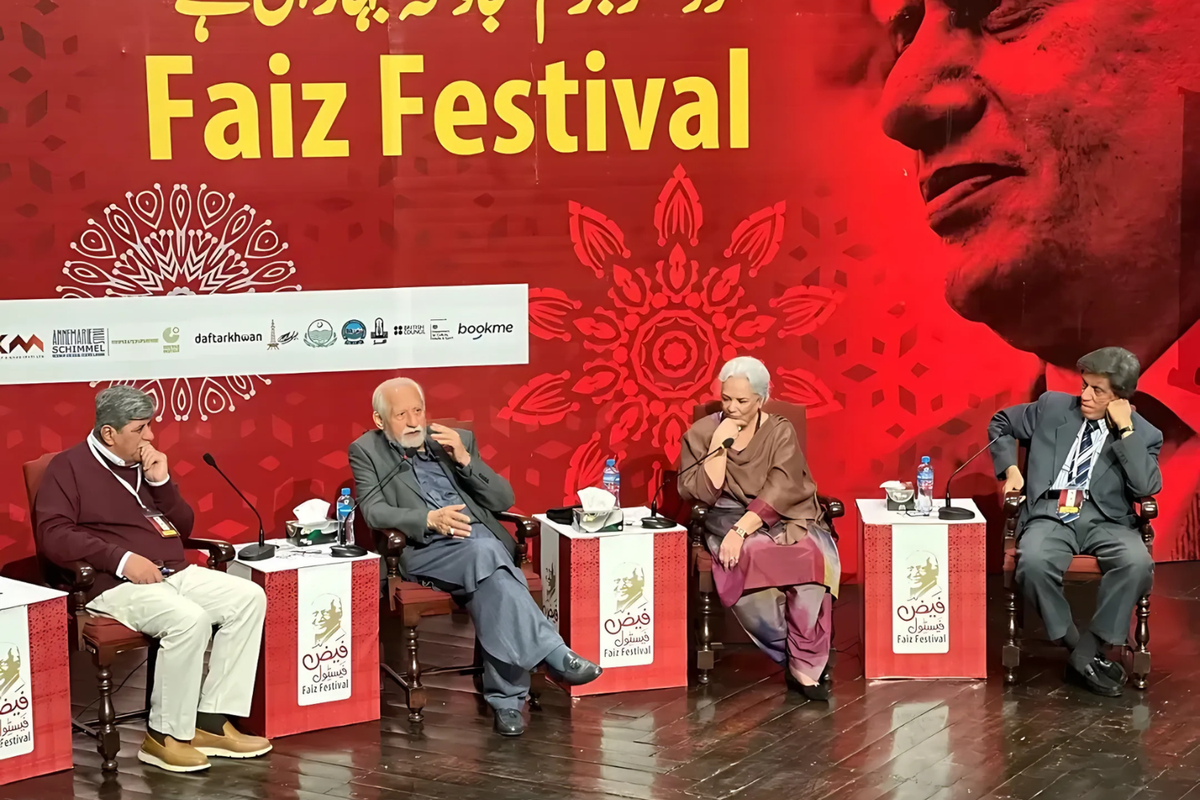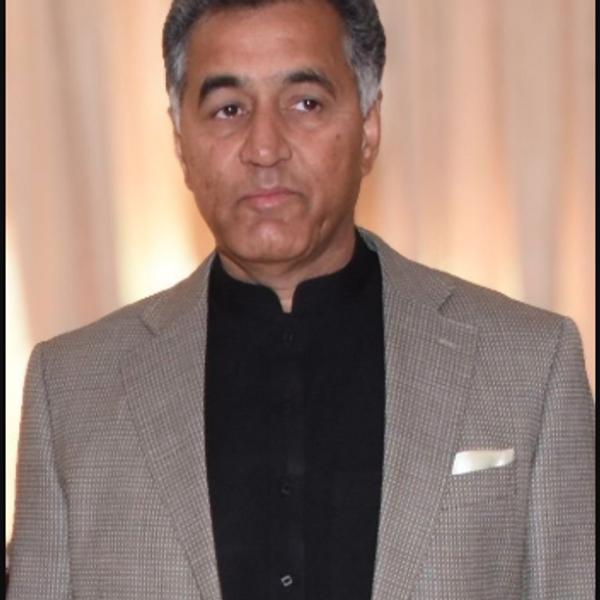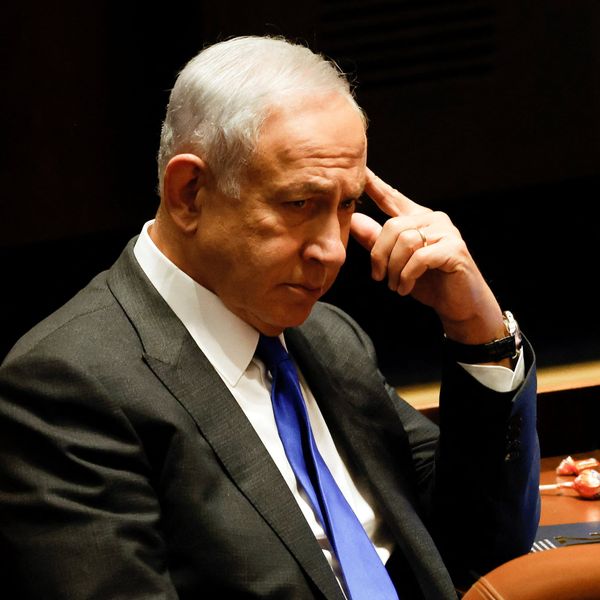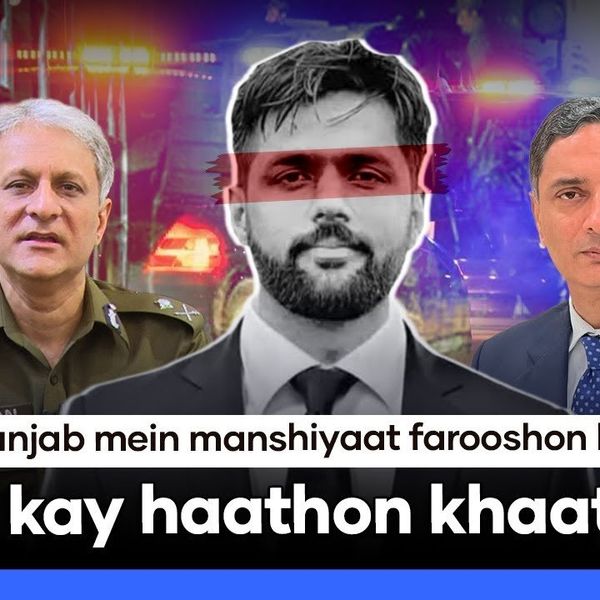Annual Faiz festival concludes with strong youth and cross-border participation
Festival combined traditional elements like poetry recitals with contemporary discussions on social media and politics

Laiba Zainab
Correspondent
Laiba Zainab is an award-winning journalist with nearly a decade of experience in digital media. She has received the DW & CEJ-IBA Data Journalism Award and the top digital media prize at the National Media Fellowship. At NUKTA, she covers underreported stories on health, crime, and social justice.

A tribute session honoring Shoaib Hashmi takes place during the 9th Faiz Festival at Alhamra, The Mall, featuring a panel of four prominent Pakistani intellectuals.
Facebook / Faiz Ghar
Faiz's daughter Moneeza Hashmi noted exceptional attendance, particularly among youth who came in organized groups
Multiple participants expressed concern about societal regression and the need to preserve Faiz's progressive message
In a celebration of literary and cultural heritage, young poetry enthusiasts joined artists and intellectuals from across South Asia at the annual Faiz Festival, a three-day cultural celebration that concluded Sunday at the Alhamra Art Centre.
Indian filmmaker Nandita Das and Pakistani actor Sarmad Khoosat were among the notable participants at the event honoring Faiz Ahmed Faiz, who emerged as Pakistan's revolutionary poet known for his verses on social justice.
Throughout the weekend, the festival featured book launches, poetry recitals, and musical performances. Attendees participated in interactive sessions including an open mic and a drum circle. Critical discussions on culture, media, and society accompanied the literary events throughout the festival.
Politics meets art
The festival's marquee events showcased an impressive lineup of cultural and political luminaries. Notable political discourse included sessions with Pakistan Peoples Party leader Nafisa Shah on federalism, while prominent political scientist Dr. Taimur Rehman led discussions on social media's impact on politics.
Classical singer Sara Raza Khan presented an evening of music, while artist Salima Hashmi's discussion on 'Palestine and Poetry of Faiz' addressed contemporary global issues. The Arshad Mahmud Choir's performance and dance recitals directed by Sheema Kermani rounded out the performing arts segment.
Among the festival's highlight events was 'A Conversation on Manto', which brought together Nandita Das and Sarmad Khoosat. Reflecting on the overall festival atmosphere, Das expressed her admiration, saying, "People are showing so much love and sharing books, I love it. All of Faiz's poetry, the emotions he expressed, are still relevant and connect all of us. Urdu survives because of this, even though cultural activities like these are becoming rare."
Echoing these sentiments, actor and filmmaker Sarmad Khoosat emphasized the festival's energy, calling it "infectious and inspiring," and advocated for more frequent literary gatherings.
Speakers praise youth participation
Poet Iftikhar Arif, who participated in 'A Conversation on Faiz's Poetry' alongside Zehra Nigah, noted the presence of young people at the festival, stating, "You must have noticed that the Faiz Festival's participants and guests are predominantly young people, which challenges the notion that social media hinders the youth's literary development."
While celebrating the festival's success, actor Faisal Rehman, a regular attendee, expressed his enjoyment of the event but suggested including more young poets and fiction writers to maintain freshness and avoid repetition. "Young people display remarkable creativity," he remarked.
"I come here every year and thoroughly enjoy it because I get to connect with like-minded people. However, they should include even more young poets and fiction writers, as having the same panelists each year can become repetitive."
Faiz's message continues to resonate
The festival's international appeal was evident in the words of Atul Bagai, a former Indian diplomat, who shared his long-standing connection with the festival, saying, "I have been attending this event since 2016, missing only one year, and the experience has been surreal."
Writer and poet Neelam Ahmed Bashir reflected on Faiz's message, expressing concern about society's regression rather than progression. "Faiz would have been disheartened to see that society has regressed instead of progressed. We must remember that the messages he conveyed 40-50 years ago should continue to guide us forward," she said.
In a particularly poignant moment, Moneeza Hashmi, Faiz's daughter, noted the enthusiastic turnout, stating, "I feel this year's event has been exceptional because even on opening day, we saw a large turnout, particularly young people who came in groups, having made a conscious decision to participate."
The festival's exploration of modern challenges included a panel on 'Politics & Social Media'. Adeel Hashmi, Faiz's grandson, remarked that Faiz would have opposed regressive laws like the Prevention of Electronic Crimes Act (PECA), saying, "He would have defied the PECA law. He wouldn't have been afraid of imprisonment and would have continued writing."










Comments
See what people are discussing